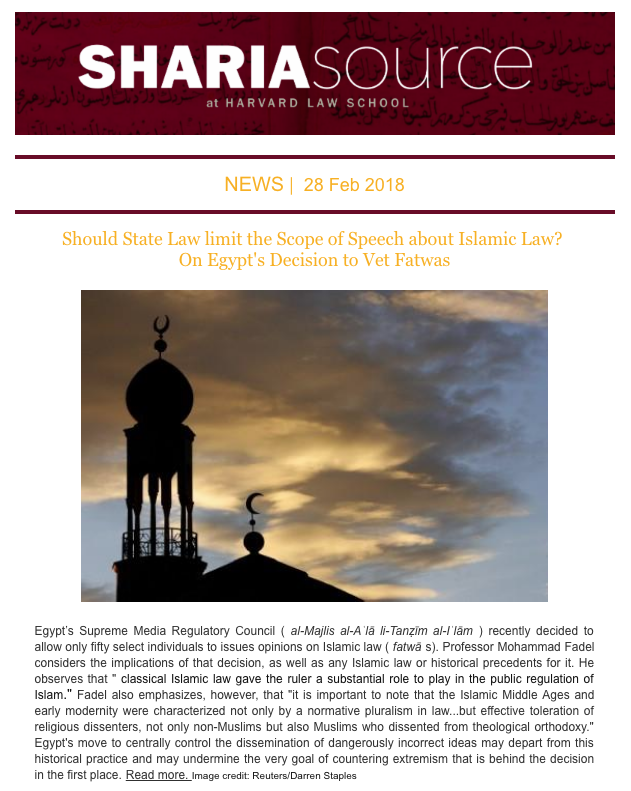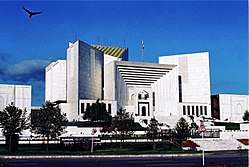
 Should State Law limit the Scope of Speech about Islamic Law? On Egypt’s Decision to Vet Fatwas Egypt’s Supreme Media Regulatory Council ( al-Majlis al-Aʿlā li-Tanẓīm al-Iʿlām ) recently decided to allow only fifty select individuals to issues opinions on Islamic law ( fatwā s). Professor Mohammad Fadel considers the implications of that decision, as well as any Islamic law or historical precedents for it. He observes that ” classical Islamic law gave the ruler a substantial role to play in the public regulation of Islam.” Fadel also emphasizes, however, that “it is important to note that the Islamic Middle Ages and early modernity were characterized not only by a normative pluralism in law…but effective toleration of religious dissenters, not only non-Muslims but also Muslims who dissented from theological orthodoxy.” Egypt’s move to centrally control the dissemination of dangerously incorrect ideas may depart from this historical practice and may undermine the very goal of countering extremism that is behind the decision in the first place. Image credit: Reuters/Darren Staples
Should State Law limit the Scope of Speech about Islamic Law? On Egypt’s Decision to Vet Fatwas Egypt’s Supreme Media Regulatory Council ( al-Majlis al-Aʿlā li-Tanẓīm al-Iʿlām ) recently decided to allow only fifty select individuals to issues opinions on Islamic law ( fatwā s). Professor Mohammad Fadel considers the implications of that decision, as well as any Islamic law or historical precedents for it. He observes that ” classical Islamic law gave the ruler a substantial role to play in the public regulation of Islam.” Fadel also emphasizes, however, that “it is important to note that the Islamic Middle Ages and early modernity were characterized not only by a normative pluralism in law…but effective toleration of religious dissenters, not only non-Muslims but also Muslims who dissented from theological orthodoxy.” Egypt’s move to centrally control the dissemination of dangerously incorrect ideas may depart from this historical practice and may undermine the very goal of countering extremism that is behind the decision in the first place. Image credit: Reuters/Darren Staples
 Expanding the Jurisdiction of Pakistan’s Federal Shariat Court Renowned Pakistani human rights lawyer Asma Jehangir passed away this month. Noor Zafar ‘s commentary examines one of her landmark cases,Abdul Waheed v. Asma Jehangir , which, she argues expanded Pakistan’s Federal Shariat Court’s (FSC) jurisdiction. At the core of this conflict was whether the Lahore High Court must consider as binding precedent the FSC’s judgment that the consent of a male guardian ( wali) is not required for a young Muslim girl to legally get married. The Supreme Court decided in favor of what it termed a “harmonious interpretation,” ruling that “the interests of uniformity and notice dictate that the FSC be granted the authority to bind lower courts on certain issues implicating Islamic law, even if this authority transcends constitutional bounds.” Read more. Image credit: The Express Tribune
Expanding the Jurisdiction of Pakistan’s Federal Shariat Court Renowned Pakistani human rights lawyer Asma Jehangir passed away this month. Noor Zafar ‘s commentary examines one of her landmark cases,Abdul Waheed v. Asma Jehangir , which, she argues expanded Pakistan’s Federal Shariat Court’s (FSC) jurisdiction. At the core of this conflict was whether the Lahore High Court must consider as binding precedent the FSC’s judgment that the consent of a male guardian ( wali) is not required for a young Muslim girl to legally get married. The Supreme Court decided in favor of what it termed a “harmonious interpretation,” ruling that “the interests of uniformity and notice dictate that the FSC be granted the authority to bind lower courts on certain issues implicating Islamic law, even if this authority transcends constitutional bounds.” Read more. Image credit: The Express Tribune
 The Muslim Family Laws Ordinance [Ordinance No. VIII of 1961] This regulation was issued to give effect to certain recommendations of the commission on marriage and Family Laws in Pakistan . The ordinance is crucial to the Pakistani Supreme Court case Abdul Waheed v. Asma Jehangir , which examined whether the Lahore High Court was bound to a decision of the Federal Shariat Court regarding Muslim Personal Law (MPL) in Pakistan. The relevant provision makes no mention of a requirement that a wali (male guardian) be present for a young Muslim girl to legally marry. Read more. Image credit: Dunya News TV
The Muslim Family Laws Ordinance [Ordinance No. VIII of 1961] This regulation was issued to give effect to certain recommendations of the commission on marriage and Family Laws in Pakistan . The ordinance is crucial to the Pakistani Supreme Court case Abdul Waheed v. Asma Jehangir , which examined whether the Lahore High Court was bound to a decision of the Federal Shariat Court regarding Muslim Personal Law (MPL) in Pakistan. The relevant provision makes no mention of a requirement that a wali (male guardian) be present for a young Muslim girl to legally marry. Read more. Image credit: Dunya News TV
See the full newsletter.

